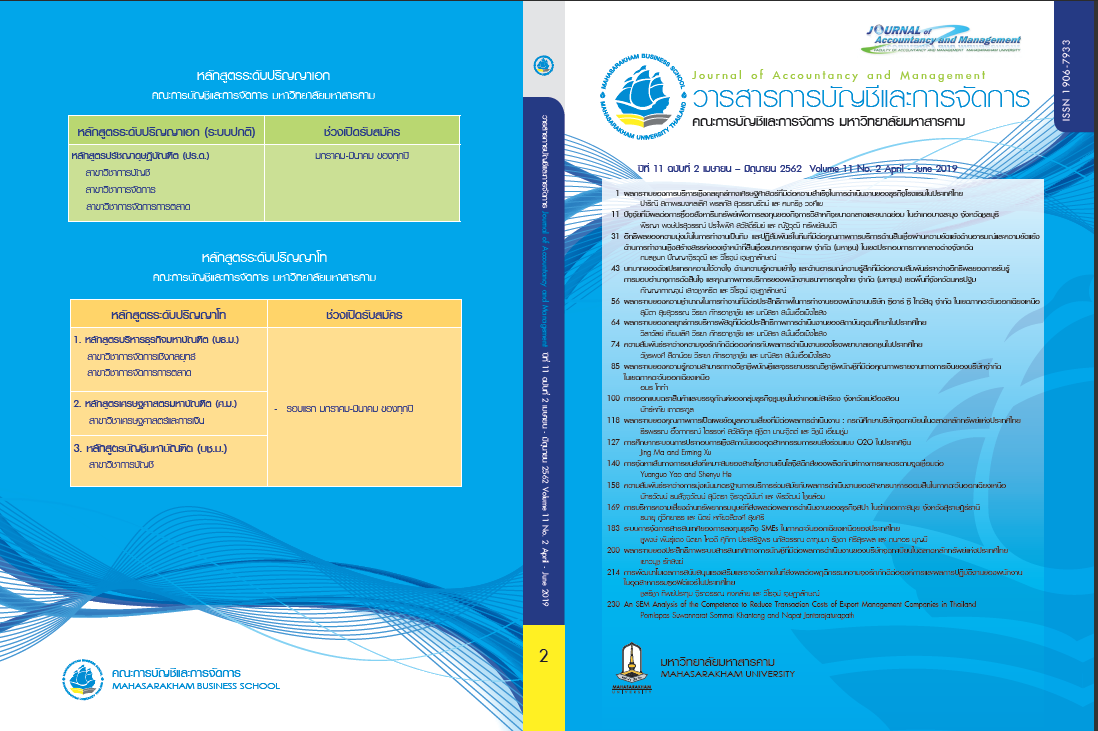ผลกระทบของความรู้ความสามารถทางวิชาชีพบัญชีและจรรยาบรรณวิชาชีพบัญชี ที่มีต่อคุณภาพรายงานทางการเงินของบริษัทจำกัดในเขตภาคตะวันออกเฉียงเหนือ
Main Article Content
บทคัดย่อ
การวิจัยในครั้งนี้มีวัตถุประสงค์เพื่อศึกษาผลกระทบของความรู้ความสามารถทางวิชาชีพบัญชีและจรรยาบรรณวิชาชีพบัญชีที่มีต่อคุณภาพรายงานทางการเงินของบริษัทจำกัดในเขตภาคตะวันออกเฉียงเหนือกลุ่มตัวอย่างที่ใช้ในการวิจัย ได้แก่ ผู้บริหารฝ่ายบัญชีของบริษัทจำกัดในเขตภาคตะวันออกเฉียงเหนือ จำนวน193 คน ซึ่งได้มาโดยการสุ่มแบบแบ่งชั้นภูมิ สถิติที่ใช้ในการวิเคราะห์ข้อมูล ได้แก่ การวิเคราะห์สหสัมพันธ์พหุคูณ และการวิเคราะห์การถดถอยแบบพหุคูณ ผลการวิจัย พบว่า 1) ความรู้ความสามารถทางวิชาชีพบัญชี ด้านความรู้ทางวิชาชีพ ด้านทักษะทางวิชาชีพ และด้านคุณค่าทางวิชาชีพ มีความสัมพันธ์และผลกระทบเชิงบวกกับคุณภาพรายงานทางการเงิน และ 2) จรรยาบรรณวิชาชีพทางบัญชี ด้านความโปร่งใส ด้านความรู้ความสามารถทางวิชาชีพ และด้านความรับผิดชอบต่อเพื่อนร่วมวิชาชีพและจรรยาบรรณทั่วไป มีความสัมพันธ์และผลกระทบเชิงบวกกับคุณภาพรายงานทางการเงิน ดังนั้น ความรู้ความสามารถทางวิชาชีพบัญชี และจรรยาบรรณวิชาชีพบัญชีมีความสัมพันธ์และผลกระทบเชิงบวกกับคุณภาพรายงานทางการเงินของบริษัทจำกัดในเขตภาคตะวันออกเฉียงเหนือ ซึ่งผลจากการวิจัยในครั้งนี้ นักบัญชีควรให้ความสำคัญต่อการพัฒนาความรู้ความสามารถทางวิชาชีพบัญชีทั้งในด้านมาตรฐาน กฎหมายที่เกี่ยวข้องกับวิชาชีพบัญชี ฝึกทักษะอย่างต่อเนื่อง นอกจากนี้ จะต้องปฏิบัติงานด้วยการยึดหลักจรรยาบรรณวิชาชีพบัญชีตามข้อกำหนดของสภาวิชาชีพบัญชีฉบับที่ 19 เพื่อให้การรายงานข้อมูลทางการเงินมีคุณภาพและเกิดความเชื่อถือได้ของผู้ใช้ข้อมูลของบริษัทจำกัดอย่างต่อเนื่อง
Downloads
Article Details
บทความที่ได้รับการตีพิมพ์เป็นลิขสิทธิ์ของวารสารการบัญชีและการจัดการ
ข้อความที่ปรากฏในบทความแต่ละเรื่องในวารสารวิชาการเล่มนี้เป็นความคิดเห็นส่วนตัวของผู้เขียนแต่ละท่านไม่เกี่ยวข้องกับมหาวิทยาลัยมหาสารคาม และคณาจารย์ท่านอื่นๆในมหาวิทยาลัยฯ แต่อย่างใด ความรับผิดชอบองค์ประกอบทั้งหมดของบทความแต่ละเรื่องเป็นของผู้เขียนแต่ละท่าน หากมีความผิดพลาดใดๆ ผู้เขียนแต่ละท่านจะรับผิดชอบบทความของตนเองแต่ผู้เดียว
เอกสารอ้างอิง
http://www.dbd.go.th/dbdweb56/ewt_news.php?nid=369.
จรรยา อุทารสวัสดิ์. (2556). การบัญชี. [ค้นเมื่อ 15 พฤศจิกายน 2560] จาก
https://sites.google.com/site/kroocherry/hone/kar-baychi.
ชัพวิชญ์ คำภิรมย์, ปพฤกษ์ อุตสาหะวาณิชกิจ และนิติพงษ์ ส่งศรีโรจน์. (2554). “ผลกระทบของความรู้ทางการบัญชีและ
ประสบการณ์ด้านการสอบบัญชีที่มีต่อความสำเร็จในการทำงานของผู้สอบบัญชีรับอนุญาตในประเทศไทย,”
วารสารการบัญชีและการจัดการ มหาวิทยาลัยมหาสารคาม. 3(3) : 28-39.
ฐิติรัตน์ มีมาก และคณะ. (2559). “ผลกระทบของจรรยาบรรณของนักบัญชีที่มีต่อประสิทธิภาพการทำงานของนักบัญชีที่ปฏิบัติงาน
ในสำนักบัญชีในเขตอำเภอเมือง จังหวัดนครราชสีมา,” วารสารวิชาการ สถาบันเทคโนโลยีแห่งสุวรรณภูมิ.
ค้นเมื่อ 15 มิถุนายน 2561. จาก www.spu.ac.th/account/files/2014/07.
บุญชม ศรีสะอาด. (2556). การวิจัยเบื้องต้น. พิมพ์ครั้งที่ 9. กรุงเทพฯ : สุวีริยาสาส์น.
สภาวิชาชีพบัญชีในพระราชบรมราชูปถัมภ์. (2553). ข้อบังคับของสภาวิชาชีพบัญชีฯ ฉบับที่ 19 เรื่องจรรยาบรรณ
ของผู้ประกอบวิชาชีพบัญชี พ.ศ. 2553. ค้นเมื่อ 23 มกราคม 2562. จาก http://www.fap.or.th/.
สภาวิชาชีพบัญชีในพระราชบรมราชูปถัมภ์. (2562). มาตรฐานรายงานทางการเงิน . ค้นเมื่อ 23 มกราคม 2562.
จาก http://www.fap.or.th/.
สภาวิชาชีพบัญชีในพระราชบรมราชูปถัมภ์. (2560). ความสำคัญของจรรยาบรรณวิชาชีพทางบัญชี. ค้นเมื่อ 25 พฤศจิกายน 2560.
จาก http://www.fap.or.th/.
สภาวิชาชีพบัญชีในพระราชบรมราชูปถัมภ์. (2560). จรรยาบรรณของผู้ประกอบวิชาชีพทางบัญชี. ค้นเมื่อ 17 พฤศจิกายน 2560.
จาก http://www.fap.or.th/
สมใจ ลักษณะ . (2546). ความสัมพันธ์ระหว่างจรรยาบรรณวิชาชีพและประสิทธิภาพการทำงานของนักบัญชีธุรกิจในเขตอุตสาหกรรม.
คณะวิทยาการจัดการ. สถาบันราชภัฎสวนสุนันทา.
อัมพร เที่ยงตระกูล. (2557). ความรู้ทางวิชาชีพ ทักษะทางวิชาชีพและคุณค่าทางวิชาชีพของผู้สอบบัญชีรับอนุญาตภายใต้
มาตรฐานสากลที่มีต่อการดำเนินงานของผู้สอบบัญชีรับอนุญาตของผู้ใช้บริการกลุ่มสินค้าอุตสาหกรรมและ
กลุ่มเทคโนโลยีในตลาดหลักทรัพย์แห่งประเทศไทย. ธุรกิจบัณฑิตย์ : มหาวิทยาลัยธุรกิจบัณฑิตย์.
Aaker, D. A., Kumar, V., & Day, G. S. (2001). Marketing Research. New York : John Wiley & Sons.
Black, K. (2006). Business Statistics for Contemporary Decision Making. 4th ed. USA : John Wiley & Son.


